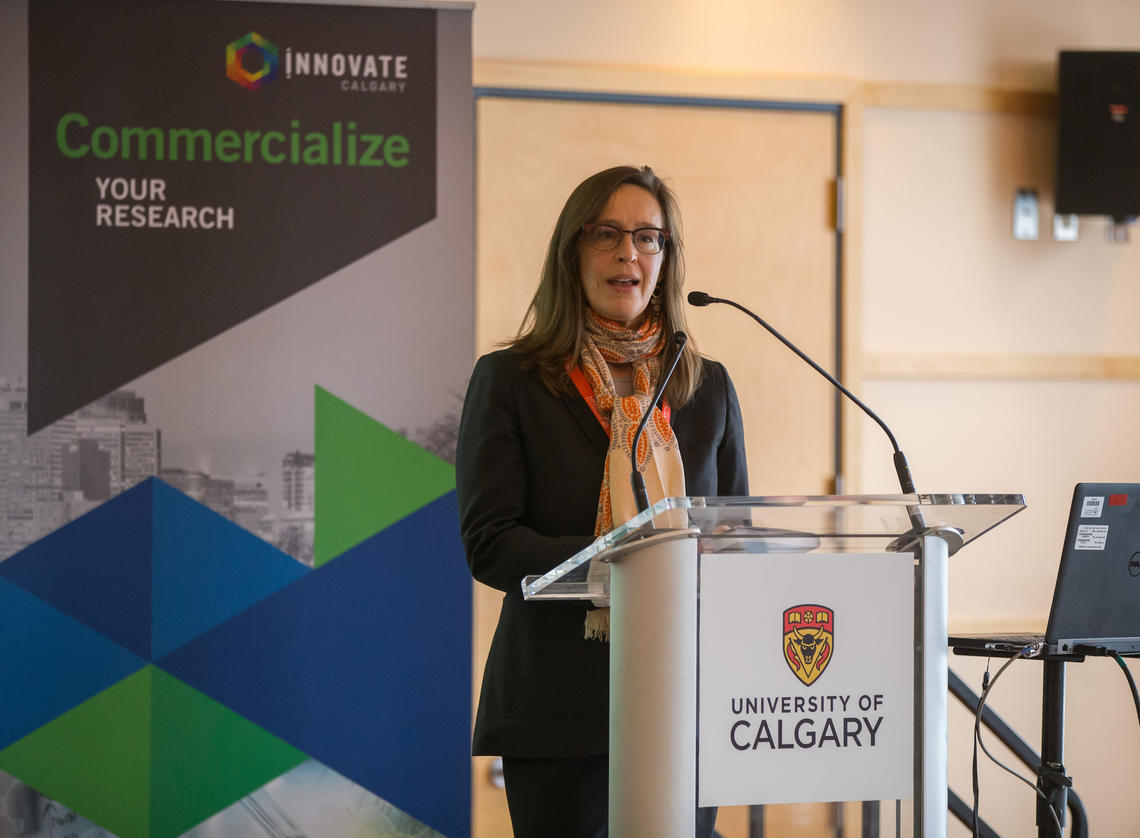Dec. 6, 2017
2017 Peak Scholars demonstrate entrepreneurial thinking, exceptional creativity and leadership

On Nov. 17, University of Calgary and Innovate Calgary leadership honoured more than 60 scholars for their outstanding accomplishments in entrepreneurship, innovation, and community engagement at the fourth annual Peak Scholars Recognition Luncheon.
Peak Scholars are researchers whose academic work has had a positive social or economic impact outside of the academy. Scholars are nominated by their deans for projects that demonstrate community or knowledge engagement, entrepreneurship, tech transfer, innovation, or collaborative research.
“These scholars have demonstrated exceptional creativity, initiative and leadership in their work. They are dedicated to advancing positive change and delivering tangible solutions to our community’s most pressing challenges,” says President Elizabeth Cannon. “Serving the needs of our community means that we need to be leaders and connectors at the same time that we are researchers and scholars. The Peak Scholars here today truly represent all of these various roles.”
This year, 33 scholars were nominated and welcomed to the Peak Scholars community by Cannon and Vice-President (Research) Ed McCauley. Twenty-eight newly awarded patent holders were also welcomed to the Peak Scholars community by Peter Garrett, CEO of Innovate Calgary.
The work recognized by Peak Scholars aligns with the focus on entrepreneurial thinking in the University of Calgary’s updated Eyes High strategy, launched by president Cannon earlier this year.
“Our pursuit of research excellence has not changed — we all strive for excellence every day. But what is new is that we’ve formally acknowledged that entrepreneurial thinking is part of our university’s DNA,” says McCauley. “Entrepreneurial thinking has always been present at the University of Calgary, and now we are taking an institutional approach to inspiring and supporting our scholars and students as they engage in entrepreneurship, innovation, and knowledge engagement.”
This year’s Peak Scholars join the 2014, 2015 and 2016 cohorts, expanding a community of researchers who will serve as ambassadors to promote entrepreneurial thinking across campus.
Below are some examples of the community-oriented research of this year’s cohort of nominated Peak Scholars and patent holders.

Cheryl Barnabe, associate professor in the Cumming School of Medicine.
Adrian Shellard, for the Office of the Vice-President (Research)
Group for Research with Indigenous Peoples (GRIP) and the Alberta Indigenous Mentorship in Health Innovation (AIM-HI) Network
- Cheryl Barnabe: Associate professor, departments of Medicine and Community Health Sciences, Cumming School of Medicine
Dr. Barnabe pursues knowledge engagement and collaborative research activities that address health priorities in Indigenous communities. Barnabe and David Turner (Alberta Health Services) co-led the successful development and growth of GRIP, which brings together over 170 scholars, stakeholders and Indigenous community members to encourage respectful research that aids Indigenous Peoples in achieving well-being.
Dr. Barnabe also led the application for the AIM-HI Network along with Drs. Cora Voyageur, Lynden Crowshoe, Karlee Fellner, Robert Henry, Jennifer Leason, Adam Murry and Rita Henderson from the University of Calgary, and Dr. Cheryl Currie from the University of Lethbridge, which will enhance capacity in health research led by Indigenous scholars. The network creates Indigenous scholar mentorship activities and opportunities for experiential engagement and advancement in Indigenous health research, scholarships for mentees, and recruitment and retention activities.

Andrew Demchuk, professor in the Cumming School of Medicine.
Adrian Shellard, for the Office of the Vice-President (Research)
Endovascular Reperfusion Alberta
- Andrew Demchuk: Professor, departments of Clinical Neurosciences and Radiology, Cumming School of Medicine
Dr. Andrew Demchuk was the lead physician for the Endovascular Reperfusion Alberta (ERA) project, which focused on redesigning the pre-hospital system of stroke care for rural patients in order to increase overall access to endovascular stroke therapy.
The project, led by the Cardiovascular Health and Stroke Strategic Clinical Network and Alberta Health Services, brought together provincial partners from across the health system. ERA re-designed pre-hospital triage and communications by creating a rural field consultation between EMS practitioners, stroke experts, and transport medical experts to identify the most time-efficient mode of transportation to the appropriate stroke centre.
The process was launched in January 2017, and as a result, Albertans anywhere in the province now have expedited access to one of the most streamlined systems of care for acute stroke treatment in the world.

Jennifer Koshan, professor in the Faculty of Law.
Adrian Shellard, for the Office of the Vice-President (Research)
The Equality Effect
- Jennifer Koshan: Professor, Faculty of Law
Since 2010, professor Jennifer Koshan has been a member of the legal team of the Equality Effect, an international network of human rights advocates working collaboratively to improve the lives of women and girls by using human rights law to achieve concrete change. Through the Equality Effect’s 3 to Be Free project, Koshan co-edited and contributed two chapters to a book project on marital rape, The Right to Say No: Marital Rape and Law Reform in Canada, Ghana, Kenya and Malawi (Hart Publishing, 2017), which will be used as the basis for law reform and litigation in the Equality Effect’s African partner countries.
Find a full list of the 2017 Peak Scholars on the website.
UCalgary’s Strategic Research Plan is part of the roadmap toward our Eyes High vision of becoming one of Canada’s top research universities. To achieve this goal, we are focused on three major priorities: matching our strengths with opportunities, increasing our research capacity, and creating a dynamic environment to promote research excellence. Learn more about the Strategic Research Themes and Platforms that provide the framework through which we are achieving our goals.
Innovate Calgary is the technology-transfer and business-incubation centre for the University of Calgary, working with the Office of the Vice-President (Research) to help bridge the gap between discovery and innovation. From ideation to commercialization, Innovate Calgary has successfully supported the innovation-driven community for 35 years.
